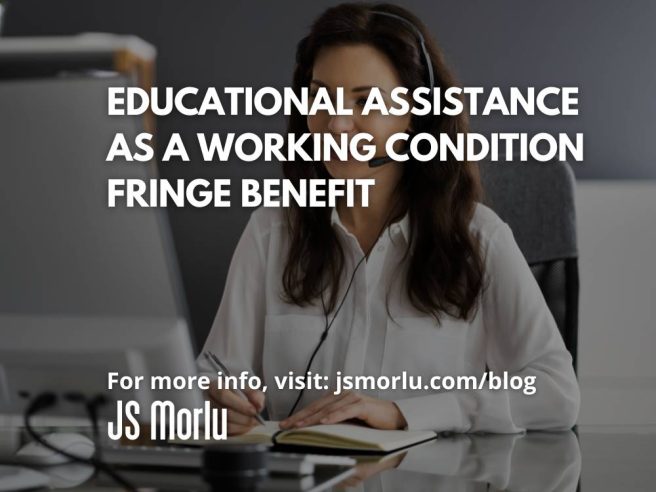By: John S. Morlu II, CPA
Educational assistance, such as tuition payments for academic programs, is considered a fringe benefit and a form of employee compensation. Generally, employees can exclude up to $5,250 of qualified employer-provided educational assistance from their taxable income. However, if the educational assistance meets the criteria for a “working condition fringe benefit,” employers can deduct higher amounts while the assistance remains tax-free for the employee.
What Makes Educational Assistance a Working Condition Fringe Benefit?
Educational payments that surpass the $5,250 threshold may be excluded from taxable income as a working condition fringe benefit under Section 132(d) of the Internal Revenue Code. This provision defines a working condition fringe benefit as “any property or services provided to an employee by the employer to the extent that, if the employee paid for such property or services, such payment would be allowable as a deduction under Section 162 or 167.”
For education payments to qualify, the critical question is whether the employee would be allowed to deduct these expenses under Section 162. To meet this standard, the education must not be part of a program that qualifies the employee for a new trade or business.
For instance, educational programs that grant degrees enabling recipients to obtain new professional licenses—such as attending medical school to become a doctor—would not qualify. This is because the education leads to qualification in a new trade or business.
In contrast, programs designed to improve existing skills used in the employee’s current job or trade are more likely to qualify. Determining whether educational assistance qualifies involves assessing three key factors:
1. The employee continues to work full-time in their established trade or business while pursuing the education.
2. The employee remains in their current trade or business after completing the program.
3. The employee uses skills taught in the program while pursuing the education.
If these conditions are satisfied and the educational program does not prepare the employee for a new trade or business, the assistance can be treated as a working condition fringe benefit.
Summary: Educational Assistance as a Working Condition Fringe Benefit
Partners and more than 2% S corporation shareholders are treated similarly to employees for the purposes of receiving working condition fringe benefits on a tax-free basis. As a result, these individuals can also benefit from educational assistance exceeding the $5,250 threshold, provided it meets the criteria for a working condition fringe benefit.
This type of fringe benefit is often used to support succession planning in family-owned businesses. For example, funding a business education such as an MBA for the next generation may qualify. The absence of nondiscrimination rules or specific dollar limits allows businesses to offer significant benefits through this approach.
Conclusion
At the maturity stage of a business, when profits are typically at their highest, owners often seek efficient ways to transfer cash or benefits to themselves or their successors. Educational assistance structured as a working condition fringe benefit is one such strategy.
Tax professionals must carefully consider reasonable compensation rules for wages, as well as the tax implications of fringe benefits. While distributions from partnerships or S corporations are generally tax-free, they can impact the owner’s ability to claim losses. Rental income may also provide cash flow, provided rent is charged at a market rate.
Ultimately, the key to successful tax planning lies in balancing these various strategies to achieve optimal results for the business owner’s unique situation. By leveraging tools like working condition fringe benefits, businesses can invest in their employees and owners while minimizing tax burdens.
Author: John S. Morlu II, CPA
John S. Morlu II, CPA, is the CEO and Chief Strategist of JS Morlu, a globally acclaimed public accounting and management consulting powerhouse. With his visionary leadership, JS Morlu has redefined industries, pioneering cutting-edge technologies across B2B, B2C, P2P, and B2G landscapes.
The firm’s groundbreaking innovations include:
• ReckSoft (www.ReckSoft.com): AI-driven reconciliation software revolutionizing financial accuracy and efficiency.
• FinovatePro (www.FinovatePro.com): Advanced cloud accounting solutions empowering businesses to thrive in the digital age.
• Fixaars (www.fixaars.com): A global handyman platform reshaping service delivery and setting new benchmarks in convenience and reliability.
Under his strategic vision, JS Morlu continues to set the gold standard for technological excellence, efficiency, and transformative solutions.
JS Morlu LLC is a top-tier accounting firm based in Woodbridge, Virginia, with a team of highly experienced and qualified CPAs and business advisors. We are dedicated to providing comprehensive accounting, tax, and business advisory services to clients throughout the Washington, D.C. Metro Area and the surrounding regions. With over a decade of experience, we have cultivated a deep understanding of our clients’ needs and aspirations. We recognize that our clients seek more than just value-added accounting services; they seek a trusted partner who can guide them towards achieving their business goals and personal financial well-being.
Talk to us || What our clients says about us



